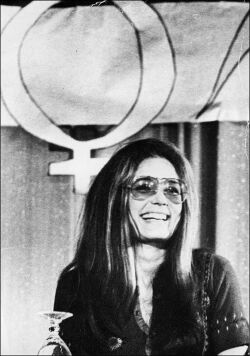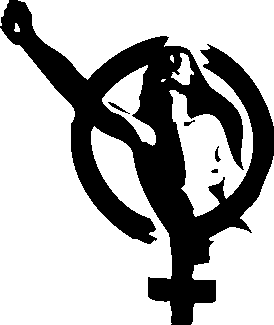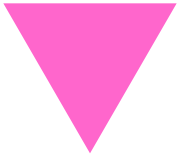"A standoff will have been achieved vis-a-vis the Russians, and our own country will be ruled by right-wingers and religious fundamentalists, with males restored to the traditional role of warriors and us females to our ''place'' - which, however, will have undergone subdivision into separate sectors, of wives, breeders, servants and so forth, each clothed in the appropriate uniform. A fresh postfeminist approach to future shock, you might say." -The New York Times Book Review on The Handmaid's Tale, 1986.
The Gilead of The Handmaid's Tale is entirely controlled by men--women are forbidden to hold public office, read or stand up to their husbands or Commanders. One of the first official acts performed by the Gileadean government was to void all women's bank accounts and, immediately following, to fire them from their jobs. All women, except for Aunts who devote themselves to working handmaids into submission, lose the right to view text--let alone read. Women are also the only people blamed for the rapid decline in birth rate--though it is implied that there are at least as many sterile men as there are women.
Atwood, who dedicated the novel to Mary Webster, a Puritan ancestor who hung as a witch, based Gilead's patriarchal society on the Puritannical New England of the seventeenth century and the Christian-Right "Moral Majority" of 1980s America: Offred'smusings over the rise of Gilead harken back to the zeal of televangelists, righteous pornography-burning parties and the convictions of anti-feminists. As in the patriarchal theocracies of the Arab world, women who fall victims to sexual crimes are considered sinful and forced to admit their sin publicly or be punished. Offred often feels as though, with her rights, her soul, voice and personality have been taken away, and she often refers to her body to a "two-legged womb", or an empty vessel or oven.
...or a Women's Culture?
"Atwood, like many feminists of the period, was keenly aware ofthe fragility of the newly acquired rights and equalities of women: of the opposition to these rights and equalities in many quarters, of the many places and ways in which these gains were threatened or actively eroded, and of the intersection of women's issues, feminist issues, and broader human rights issues." -Shirley Neuman, "'Just a Backlash': Margaret Atwood, Feminism and The Handmaid's Tale.
An oft-criticized point in The Handmaid's Tale is the novel's frequent implication that traditional feminism is as responsible for Gilead as are the Christian fundamentalists. If the novel is a cautionary tale, which path are we to follow to redemption?
Indeed, many elements of traditional feminism, such as empowering women by discouraging the production and sale of pornography, are very similar to the conservative philosophies of Gilead. Offred recalls burning pornographic magazines on bonfires as a child with her feminist mother, but she also remembers government-mandated bonfires of pornography and erotic artifacts after the Gileadean takeover. Female empowerment, another theme of modern feminism, is also used by the Gileadean government to brainwash Handmaids:
"Sometimes the movie[s Aunt Lydia showed at the Red Center]...would be an old porno film, from the seventies or eighties. Women kneeling, sucking penises or guns, women tied up or chained with dog collars around their necks, women hanging from trees, or upside-down, naked, with their legs held apart, women being raped, beaten up, killed...Consider the alternatives, said Aunt Lydia. You see what things used to be like? That was what they thought of women, then. Her voice trembled with indignation." -The Handmaid's Tale, p. 118.
IIn other parts of Offred's Red Center recollections, Aunt Lydia tells the future Handmaids that men are pigs with no control over their sexual urges, and that women are completely superior, which is why the future of the society lays in their hands--an idea which is espoused by extreme feminists. Aunts also claim that Gilead's society requires a tight, familial sisterhood among all women. While Gilead is the dystopian embodiment of the worst type of right-wing agenda, Atwood portrays modern feminists, like Offred's mother, as at least being partially responsible for the state of society.
Offred's mother, the symbol of traditional, 1970s feminism in the novel, is the object of many conflicting feelings for Offred, particularly admiration and resentment. Offred remembers that as a child, she resented her mother for trying to appear younger and more outrageous than appropriate, and for moving about the country for activist reasons. Since Offred is a passive character who rarely realizes her own power, this may be construed as jealousy. However, Atwood writes the story so that Moira and Offred's mother--the two most active feminists in the novel--are assimilated into the society in the saddest ways, as a Jezebel and an Unwoman.
It must also be remembered that, while women in The Handmaid's Tale are hopelessly oppressed, they are also celebrated. Handmaids, while scorned in social situations, are reminded by Aunts that that their fertility is "a national resource". Offred is able to flout the rules of Gilead simply because she is a fertile woman.
"Mother, I think. Wherever you may be. Can you hear me? You wanted a women's culture. Well, now there is one. It isn't what you meant, but it exists. Be thankful for small mercies." Offred, The Handmaid's Tale p. 127
Gay and Lesbian Issues
Women are not the only sexual group discriminated against in The Handmaid's Tale. The first description given of the city wall where bodies of executed criminals are hanged includes some bodies with pink triangles on their chest, representing what the Gileadeans have dubbed "gender treachery". Due to Gilead's need for a steady birth rate, out lesbians are given the option of becoming Handmaids, Unwomen or Jezebels, while it is assumed that male homosexuals are closeted or killed. Again, the institutionalized homophobia in Gilead is part of Atwood's response to the Moral Majority, which was very vocal about the "sin" of homosexuality, for which the AIDS epidemic was supposedly God's retribution.
 Before the patriarchal society of Gilead was founded, Offred resented her mother, a traditional feminist not unlike Gloria Steinem.
Before the patriarchal society of Gilead was founded, Offred resented her mother, a traditional feminist not unlike Gloria Steinem. 
